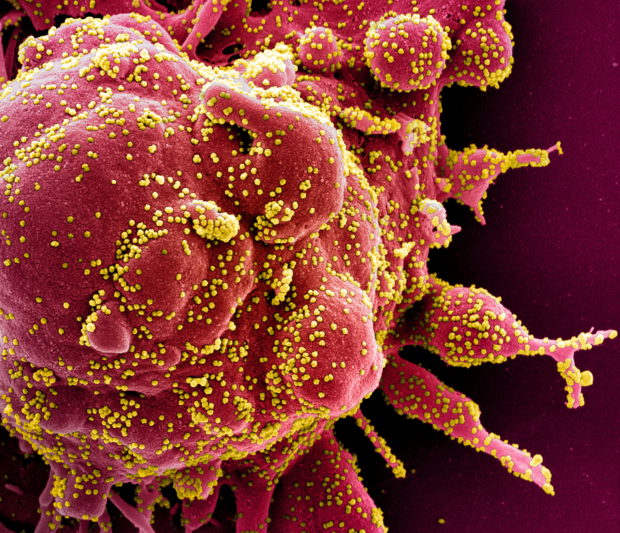‘Mini surge’ in COVID-19 cases later this July likely, says OCTA Research

FILE PHOTO: Colorized scanning electron micrograph of an apoptotic cell (red) infected with SARS-COV-2 virus particles (yellow), also known as novel coronavirus, isolated from a patient sample. Image captured at the NIAID Integrated Research Facility (IRF) in Fort Detrick, Maryland. National Institute of Allergy and Infectious Diseases, NIH/Handout via REUTERS.
MANILA, Philippines — There is a possibility of a “mini-surge” in COVID-19 cases later this month, based on the calculation of independent pandemic monitor OCTA Research.
“Yan pa rin ang projection natin na mukhang weak or mini surge ang nakikita natin,” said OCTA Research fellow Dr. Guido David during a Laging Handa briefing on Monday.
(That is still our projection, it seems that it will be a weak or mini surge.)
Recently, David noted that the COVID-19 growth rate in Metro Manila has gone down – which, he also had said, could be an indication that cases “could be peaking” in the first or second week of July.
Article continues after this advertisementDavid, however, stressed that the projected “mini surge” will not reach the level of COVID-19 cases the country saw in January during the “Omicron wave.”
Article continues after this advertisement“Ipagkumpara natin ‘yung mga nangyari sa ibang bansa na nagkaroon sila ng pagtaas ng bilang ng kaso because of the Omicron BA.4 saka BA.5 na ngayon ay kumakalat dito sa bansa natin, ganun din yung nakita natin, mini surge. Hindi siya tulad ng level ng January this year – the first Omicron wave – at saka last year, ‘yung Delta, saka ‘yung Alpha and Beta,” he said.
(If we compare our situation with other countries which have seen a rise in COVID-19 cases because of the Omicron BA.4 and the BA.5 that we are also detecting, we are seeing the same situation with our country, it’s a mini-surge. It’s not on the same level as what we’ve seen in January this year – the first Omicron wave – and also last year, the increase caused by Delta and by Alpha and Beta.)
He likewise noted a slower spread of the virus.
“Mas mabagal ‘yung hawahan. Kasi nung January, ‘yung reproduction number umabot sa 4 or higher. Pero sa ngayon nasa mga 1.5, 1.6 kaya hindi ganoon kabilis ang hawahan at mas mababa ‘yung level of cases,” David said.
(The spread is slower. Because in January, the reproduction number reached 4 or higher. But now, we are seeing 1.5 to 1.6 that’s why the transmission is not that quick and the level of cases is lower.)
“Nung January, umabot po tayo ng 40,000 almost. Last year, umabot tayo mga more than 25,000 tapos ngayon nasa mga 1,300 tayo daily over the past few days, hindi pa ‘yan ganun ka-concerning kasi malayo siya sa mga levels na nakita natin dati,” he added.
(In January, we reached almost 40,000. Last year, we reached 25,000 and now we have around 1,300 daily cases over the past few days, it’s not that concerning because this level is far from what we’ve seen before.)
Healthcare not ‘threatened’
Meanwhile, David said the country’s healthcare could not be considered “threatened” now because its utilization rate continues to be at a “low” level.
“Hindi natin masasabing threatened tayo dito sa healthcare utilization rate [We can’t say at this point that our healthcare utilization is threatened],” he said.
On Sunday, the Department of Health (DOH) recorded 1,323 new COVID-19 cases, raising the number of active infections to 9,703.
Based on the DOH’s COVID-19 tracker, these new cases also pushed the country’s total caseload to 3,708,271 nationwide, including 3,637,976 recoveries and 60,592 deaths, since 2020.
KGA
For more news about the novel coronavirus click here.
What you need to know about Coronavirus.
For more information on COVID-19, call the DOH Hotline: (02) 86517800 local 1149/1150.
The Inquirer Foundation supports our healthcare frontliners and is still accepting cash donations to be deposited at Banco de Oro (BDO) current account #007960018860 or donate through PayMaya using this link.